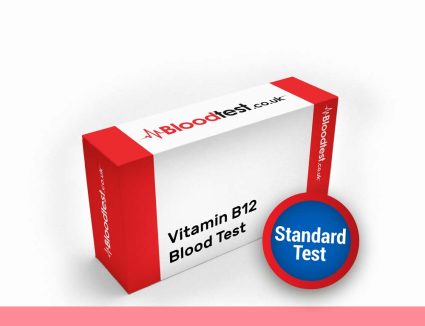Why Regular Monitoring of Vitamin B12 Levels is Crucial for Your Health
Exploring the Indispensable Functions of Vitamin B12 in the Body

Regular testing through a vitamin B12 blood test in Brighton is not just a suggestion for those at risk; it is a vital aspect of personal healthcare management. Being unaware of your B12 levels could result in severe health ramifications that can be entirely avoided with timely assessments and interventions. vitamin B12 is an essential nutrient that plays a significant role in maintaining the overall health of the nervous system and is critical for the production of red blood cells. This key B vitamin is necessary for DNA synthesis and metabolic processes at the cellular level, which are fundamental for energy generation. A deficiency in vitamin B12 can lead to serious health issues, including pernicious anaemia and a range of neurological disorders.
 Spotting the Early Warning Signs of Vitamin B12 Deficiency
Spotting the Early Warning Signs of Vitamin B12 Deficiency
Recognising the early symptoms of a vitamin B12 deficiency is essential for effective management before severe complications arise. Common signs of this deficiency include persistent fatigue, weakness, and noticeable paleness of the skin. Neurological symptoms, such as numbness, tingling sensations, and balance issues, may also surface, highlighting the urgent need for a blood test if you experience these indicators. Additionally, fluctuations in mood and cognitive changes, including difficulties concentrating and memory lapses, can also suggest a deficiency. Brighton's vitamin B12 blood test can detect these deficiencies early, facilitating timely interventions and lifestyle adjustments that can significantly enhance your health outcomes.
Recognising Vulnerable Groups That Require Vitamin B12 Deficiency Testing
Certain demographic groups are at a heightened risk of experiencing vitamin B12 deficiency and should consider regular testing. Individuals adhering to vegetarian or vegan diets often have lower levels of B12, as this vital vitamin is predominantly sourced from animal-derived products. Moreover, older adults are particularly susceptible due to their diminished ability to absorb nutrients and dietary changes over time. Additionally, individuals suffering from gastrointestinal disorders like Crohn’s disease or celiac disease may face significant challenges in effectively absorbing B12. Recognising these risk factors enables individuals to take proactive steps towards maintaining optimal health through consistent vitamin B12 blood tests in Brighton.
Establishing the Recommended Frequency for Vitamin B12 Testing

An annual testing schedule is typically recommended for individuals at risk of deficiency. This proactive strategy allows for the monitoring of B12 levels, which can help prevent deficiencies from developing. For others, particularly those without symptoms or known risk factors, testing every two to three years is generally sufficient to ensure that levels remain within a healthy range. Regular testing reinforces the importance of being aware of your vitamin levels, and for residents in Brighton, local clinics provide accessible options for these essential tests.
Understanding Your Vitamin B12 Test Results for Better Health Management
Interpreting the results of your vitamin B12 test is crucial for accurately assessing your health. Normal vitamin B12 levels usually range between 200 and 900 picograms per millilitre, although optimal levels may vary based on individual health requirements. Low levels necessitate further investigation and could indicate various underlying health issues. It is imperative to discuss your results with your GP, who can assist in determining whether supplementation or dietary changes are necessary. Elevated levels may require additional testing to rule out potential health concerns, including liver disease or certain blood disorders.
How to Access Vitamin B12 Testing Services in Brighton
Discovering Local Clinics Offering Comprehensive B12 Testing Services

Brighton is home to numerous clinics that provide vitamin B12 blood tests as part of their comprehensive healthcare offerings. The Brighton Health Centre is a reputable option, delivering thorough health assessments, including B12 testing. Additionally, several local pharmacies feature health clinics that facilitate easy access to testing. The friendly staff and efficient processes at these clinics make them ideal for individuals seeking to conveniently monitor their vitamin levels.
Opting for Private Laboratory Testing to Enhance Confidentiality
Private laboratories such as Medichecks offer efficient vitamin B12 blood testing in Brighton for those seeking a quicker and more confidential testing option. These services cater to individuals who prefer a swift turnaround and a more personalised experience. Results can often be obtained within days, providing peace of mind and prompt insights into one’s nutritional status. Furthermore, private tests can be tailored to meet individual health needs, delivering a customised service that public healthcare may not always provide.
Utilising NHS Services for Comprehensive B12 Testing
The NHS in Brighton offers testing for vitamin B12, although it typically requires a referral from your GP. This process ensures that individuals at risk of deficiency receive appropriate care and guidance. While the NHS route may take longer than private testing options, it provides reassurance that the testing is conducted within a comprehensive healthcare framework. If your GP suspects a deficiency based on symptoms or risk factors, they can facilitate the necessary testing process.
Convenience of At-Home Testing Kits for Vitamin B12 Levels
For those who prefer a more private approach, several companies offer at-home testing kits for vitamin B12. These kits can be easily ordered online and used in the comfort of your own home in Brighton. They typically involve a simple finger prick to collect a blood sample, which is then sent to a laboratory for analysis. This method offers convenience and discretion, appealing to individuals who may feel apprehensive about visiting a clinic. Results are usually available online, empowering users to take control of their health with minimal disruption.
Participating in Community Health Events for Free Testing Opportunities
Brighton frequently hosts community health events that offer free or low-cost vitamin B12 testing. Local health charities and community groups often organise these events to promote public health awareness. Participating in these events not only provides an opportunity for testing but also encourages community engagement and support. Keep an eye on local listings or community boards for announcements, as these events can be an excellent way to monitor your vitamin levels without incurring the usual costs.
Preparing Effectively for Your Vitamin B12 Test
Clarifying Fasting Requirements Before Undergoing Testing
Confirming whether fasting is necessary before undergoing a vitamin B12 blood test in Brighton is of utmost importance. While many B12 tests do not require fasting, certain specific tests may. Fasting for several hours before the test can help ensure the accuracy of the results. If your healthcare provider advises fasting, it is usually recommended that you refrain from eating for at least six to eight hours before the test. Always clarify these requirements with your healthcare professional to ensure the testing process proceeds smoothly and yields the most accurate results.
Essential Preparation Checklist: What to Bring for Your Appointment
When attending your vitamin B12 testing appointment, it is prudent to arrive well-prepared. Bringing identification and any pertinent medical records that can provide context for your healthcare providers is crucial. Additionally, having a comprehensive list of your current medications and supplements can assist in interpreting your test results. This information is vital, as certain medications can influence B12 levels. Being well-prepared ensures that healthcare professionals can deliver the best care tailored to your health needs.
What to Expect During the Vitamin B12 Testing Procedure
The process for a vitamin B12 test is straightforward and relatively quick. Typically, a healthcare professional will draw blood from a vein in your arm, which usually takes just a few minutes. You may feel a slight pinch as the needle is inserted, but this discomfort is generally minimal and brief. Once the blood sample is collected, it will be sent to a laboratory for analysis, and you can expect to receive your results within a few days to a week, depending on the facility where you undergo testing.
Understanding Your Test Results: Insights into Vitamin B12 Levels
Defining Normal Vitamin B12 Levels for Health Assessment
Interpreting your vitamin B12 test results can provide significant insights into your health. Normal levels are typically defined as ranging from 200 to 900 picograms per millilitre. However, interpretations can vary slightly based on the specific reference ranges utilised by different laboratories. Understanding where your levels fall within this spectrum is essential; levels at the lower end may indicate a deficiency that requires attention. Consulting with your healthcare provider will offer clarity and guidance on the appropriate next steps based on your results.
Addressing Low Vitamin B12 Levels and Their Health Implications
If your test results reveal low vitamin B12 levels, it is crucial to take the implications seriously. A deficiency can lead to numerous health issues, including fatigue, irritability, and neurological complications. Low levels may necessitate further examination to identify the underlying cause, such as dietary insufficiency or absorption challenges. Your GP can offer tailored recommendations, including dietary modifications or supplementation. Early intervention is key to significantly improving health outcomes and preventing long-term complications.
Next Steps to Consider Following Your Test Results
Upon receiving your test results, especially if they indicate a deficiency, it is essential to discuss them with your GP. They can help clarify your results in the context of your overall health and determine whether dietary changes or a supplementation regimen are necessary. If supplementation is indicated, your healthcare provider will guide you through the various types of supplements available, including oral tablets, sublingual forms, or injections, depending on the severity of your deficiency and individual health context.
Understanding the Implications of Elevated Vitamin B12 Levels
Interestingly, elevated vitamin B12 levels are not always a cause for celebration. High levels can sometimes indicate underlying health conditions, such as liver disease or specific types of leukaemia. If your test results indicate elevated B12, further medical evaluation is necessary to determine the underlying cause. It is crucial to remain informed about the implications of both low and high levels, as each presents unique health considerations that warrant thorough attention.
The Importance of Regular Monitoring of Vitamin B12 Levels
Regular monitoring is essential for individuals at risk of vitamin B12 deficiency. If you are undergoing long-term treatments or have specific dietary restrictions, your healthcare provider may recommend more frequent testing to ensure your levels remain stable. Keeping track of your vitamin B12 levels is critical for maintaining overall health, especially since age, diet, and health conditions can influence vitamin absorption and utilisation.
Exploring Effective Treatment Strategies for Vitamin B12 Deficiency
Incorporating Nutrient-Rich Dietary Sources of Vitamin B12 into Your Meals
Maintaining adequate vitamin B12 levels begins with a diet rich in B12-containing foods. Excellent sources include animal-based products such as meat, fish, eggs, and dairy. For those adhering to vegetarian or vegan diets, fortified foods such as specific cereals and plant-based milk alternatives can help bridge the nutritional gap. Additionally, nutritional yeast has gained popularity among individuals on plant-based diets. Learning how to effectively incorporate these foods into your daily meals is vital for long-term health and can help prevent the onset of deficiencies.
Utilising Vitamin B12 Supplements as a Key Component of Treatment
Vitamin B12 supplements become a crucial component of treatment in cases of deficiency. These supplements are available in various forms, including oral, sublingual, and injectable. The choice of supplement often depends on the severity of the deficiency and individual absorption rates. Your healthcare provider will guide you through the options and recommend the most suitable form based on your test results and health history. Regular monitoring while on supplements is essential to ensure that you achieve optimal levels and to adjust dosages as necessary.
Ensuring Ongoing Monitoring and Comprehensive Care for Vitamin B12 Levels
Once you initiate treatment for vitamin B12 deficiency, continuous monitoring becomes paramount. Regular follow-up tests are necessary to assess how well your body responds to the treatment and to adjust supplement dosages if needed. Healthcare providers typically recommend follow-up testing every few months until your levels stabilise, after which less frequent testing may suffice. This proactive approach is vital in managing your health effectively and ensuring that you maintain adequate B12 levels over time.
Administering Vitamin B12 Injections for Severe Deficiencies
Vitamin B12 injections may be the most effective treatment option for individuals diagnosed with severe deficiencies or absorption issues. These injections deliver the vitamin directly into the bloodstream, bypassing any potential absorption problems in the digestive tract. This method is particularly beneficial for individuals with gastrointestinal disorders, as well as those who cannot meet their B12 requirements through diet or oral supplements alone. Your GP will evaluate whether injections are necessary based on your test results and overall health.
Implementing Lifestyle Adjustments and Dietary Changes for Optimal Health
In addition to dietary changes and supplementation, lifestyle adjustments can significantly enhance vitamin B12 levels. This includes maintaining regular health check-ups, engaging in balanced physical activity, and paying attention to overall nutrition. Recognising the importance of vitamin B12 in your diet and lifestyle empowers you to take charge of your health. Making informed choices can not only avert deficiencies but also greatly improve overall wellbeing.
Understanding the Cost and Accessibility of Vitamin B12 Testing in Brighton
Comparing NHS and Private Testing Costs for Vitamin B12
When considering a vitamin B12 blood test in Brighton, understanding the cost implications associated with both NHS and private testing options is crucial. NHS testing is provided free of charge with a referral from a GP, making it an accessible choice for many individuals. In contrast, private testing can range from £30 to £100, depending on the clinic and any additional services offered. This price disparity reflects the speed and convenience often associated with private healthcare. Evaluating your health insurance options and personal budget will assist you in determining the best approach for your testing needs.
Accessibility of Various Vitamin B12 Testing Options in Brighton
Brighton’s healthcare landscape offers diverse testing options to ensure residents have access to essential health services. With local clinics, hospitals, and private laboratories all providing vitamin B12 blood tests, individuals can choose the option that best aligns with their health needs and budgetary constraints. Community health initiatives and events further enhance accessibility, allowing individuals to take charge of their health without incurring financial burdens. The combination of NHS services and private alternatives guarantees comprehensive coverage for those seeking vitamin B12 testing in Brighton.
Summarising the Costs and Accessibility of Testing Options
In conclusion, navigating the costs and accessibility of vitamin B12 testing in Brighton reveals various options tailored to diverse needs. The availability of both NHS and private testing ensures that everyone can prioritise their health and wellbeing. Understanding these options empowers individuals to take proactive steps in monitoring and maintaining their vitamin B12 levels, fostering a healthier community overall.
Frequently Asked Questions About Vitamin B12 Testing
What does a vitamin B12 blood test entail?
A vitamin B12 blood test measures the level of vitamin B12 in your bloodstream, evaluating whether your body is receiving sufficient amounts of this essential nutrient.
How long does it take to receive results from a vitamin B12 test?
Typically, results from a vitamin B12 test take a few days to a week, depending on whether the clinic or laboratory is processing the test.
Is a referral required for a vitamin B12 test through the NHS?
Generally, a referral from your GP is necessary to obtain a vitamin B12 test via NHS services.
Can I take supplements before undergoing the test?
It is advisable to consult your healthcare provider regarding supplements before testing, as they may affect the results.
What are the potential side effects associated with vitamin B12 injections?
Vitamin B12 injections are typically safe; however, some individuals may experience mild side effects such as redness at the injection site or a sensation of warmth.
What natural methods can I employ to increase my vitamin B12 levels?
Incorporating a greater variety of animal-based foods, fortified cereals, and nutritional yeast into your diet can naturally boost your vitamin B12 levels.
Are vegan sources of vitamin B12 effective for maintaining levels?
Vegan sources of vitamin B12, including fortified foods and supplements, can effectively sustain adequate levels, but regular monitoring is essential.
What are the implications of having elevated vitamin B12 levels?
High vitamin B12 levels may indicate underlying health issues requiring further investigation, such as liver disease or certain malignancies.
How frequently should I undergo testing for vitamin B12?
Individuals at risk of deficiency should consider annual tests, while others might test every two to three years to monitor their levels effectively.
Where can I access vitamin B12 testing in Brighton?
You can obtain testing at local clinics, private laboratories, NHS services, or even through at-home testing kits available for purchase online.



I couldn’t agree more with the emphasis on regular monitoring of vitamin B12 levels. Having experienced a B12 deficiency myself, I can attest to how easily it can be overlooked until more serious symptoms arise. It’s fascinating how a single vitamin can have such far-reaching effects on our health, particularly concerning energy levels and cognitive function.
I can relate to your experience with B12 deficiency; it’s definitely a health issue that seems to fly under the radar for a lot of people. I remember a friend of mine went through something similar, and it took a while for the doctors to figure it out. Once she started supplementing, the change in her energy levels was apparent almost immediately. It really highlights how interconnected our bodies are—like, just one vitamin can impact everything from our mood to brain function.
I found this local guide on vitamin D testing in Banbury really helpful; it highlights how crucial it is to keep tabs on our vitamin levels, especially since they can greatly impact our overall health.
‘Vitamin D Blood Test: Your Local Guide in Banbury’
https://ezbloodtest.com/vitamin-d-blood-test-your-local-guide-in-banbury/.
You’re spot on about B12 deficiency – it really can be a sneaky issue that doesn’t get the attention it deserves. I think a lot of people just assume fatigue is part of life, but sometimes it’s a sign of something more. Your friend’s experience shows how crucial it is to listen to our bodies. It’s fascinating how something as simple as a vitamin can make such a difference in mood and energy.
Thank you for sharing your friend’s experience—it’s a great reminder of how important it is to stay on top of our vitamin levels! If you’re interested in learning more about vitamin D testing options in Banbury, check out this helpful local guide that can help you prioritize your health: [Vitamin D Blood Test: Your Local Guide in Banbury](https://ezbloodtest.com/vitamin-d-blood-test-your-local-guide-in-banbury/).
https://ezbloodtest.com/askadoctor
You raise some important points about vitamin B12, and your personal experience gives a real depth to the discussion. It’s true that B12 deficiency can sneak up on people—you often don’t notice the early signs until they escalate. I’ve read about how it can affect different aspects of our lives, from mood swings to fatigue, which makes it all the more crucial to keep an eye on our levels.
I couldn’t agree more with the emphasis on the regular monitoring of vitamin B12 levels! It’s astonishing how a single vitamin can have such a profound impact on our health, yet so many people remain unaware of its significance. I remember learning about B12 during a nutrition class, and it truly opened my eyes to how interconnected our bodily systems are. It’s not just a vitamin; it’s a crucial player in our health story.